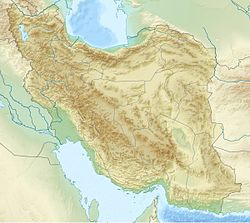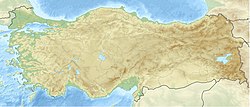2020 Iran–Turkey earthquakes
| UTC time | |
|---|---|
| A: 2020-02-23 05:53:01 | |
| B: 2020-02-23 16:00:31 | |
| ISC event | |
| A: 617549836 | |
| B: 617549818 | |
| USGS-ANSS | |
| A: ComCat | |
| B: ComCat | |
| Local date | 23 February 2020 |
| Local time | |
| A: 09:23 IRST (UTC+3:30) | |
| B: 19:30 IRST | |
| Magnitude | |
| A: 5.8 Mw[1] | |
| B: 6.0 Mw | |
| Depth | |
| A: 10.0 km (6 mi) | |
| B: 10.0 km (6 mi) | |
| Epicentre | 38°33′01″N 44°57′08″E / 38.55028°N 44.95222°E |
| Type | Oblique-slip normal |
| Areas affected | Iran, West Azerbaijan Province; Turkey, Van Province |
| Max. intensity | MMI VII (Very strong) |
| Casualties | 10 dead, 141 injured |
The first and most destructive of the 2020 Iran–Turkey earthquakes occurred on 23 February, near Khoy in north-west Iran, close to the border with Turkey, killing 9 people in Başkale, Van.[2] It hit at 9:23 a.m. local time (05:53 UTC) with a magnitude of 5.8 Mw[1] at a depth of 6 kilometres (3.7 miles)[3] and the epicenter was Qotur district, according to the Iranian Seismological Center (IRSC). About 10 hours later the same area was hit by another major earthquake of 6.0 Mw .[4]
Tectonic setting
[edit]Northwestern Iran and easternmost Turkey lie within the zone of complex structure associated with the continuing collision between the Arabian plate and the Eurasian plate. On this part of the boundary the collision is quite oblique and the thrust faulting along the front of the Zagros fold and thrust belt is accompanied by a series of NW–SE trending dextral (right-lateral) strike-slip faults, such as the North Tabriz Fault and the Gailatu–Siah Chesh-meh–Khoy Fault. Normal faults are developed at terminations and releasing bends on the strike-slip faults. The entire fault system is active and has been associated with many destructive earthquakes.[5]
Earthquakes
[edit]The first of the larger earthquakes had a magnitude of 5.8 Mw with a depth of 10 km (ANSS),[1] 5.8 ML with a depth of 8 km (KOERI),[6] or 5.7 mbLg with a depth of 6 km (Iranian Seismological Center (IRSC)).[7] It was followed just over 10 hours later by the second event, which had a magnitude of 6.0 Mw with a depth of 10 km (ANSS),[4] 5.8 ML with a depth of 5 km (KOERI),[8] or 5.9 mbLg with a depth of 12 km (IRSC).[9]
Damage
[edit]The area of significant damage stretched from the city of Van in the west to Khoy in Iran to the east. More than 1,000 buildings were destroyed in Turkey,[10] with many others damaged in 43 affected villages in Iran.[11] The Turkish health ministry reported that nine people had died, four of them children,[12] with another 66 injured.[13] 75 people were reported injured in Iran.[11] No further casualties have been reported in Turkey following the Mw 6.0 earthquake.[14] Death toll climbed to 10 when a teenager later died in the hospital.[15]
See also
[edit]- List of earthquakes in 2020
- 2020s in environmental history
- List of earthquakes in Iran
- List of earthquakes in Turkey
References
[edit]- ^ a b c ANSS. "Iran–Turkey 2020a: M 5.8 – 26 km ESE of Saray, Turkey". Comprehensive Catalog. U.S. Geological Survey. Retrieved 1 March 2020.
- ^ "Several dead in Turkish province bordering Iran after earthquake". Aljazeera. 9 February 1998. Retrieved 23 February 2020.
- ^ Burak Bir (23 February 2020). "5.7-magnitude earthquake strikes northwestern Iran". Anadolu Agency. Retrieved 23 February 2020.
- ^ a b ANSS. "Iran–Turkey 2020b: M 6.0 – 25 km SE of Saray, Turkey". Comprehensive Catalog. U.S. Geological Survey. Retrieved 23 February 2020.
- ^ Karakhanian, A.S.; Trifonov, V.G.; Philip, H.; Avagyan, A.; Hessami, K.; Jamali, F.; Bayraktutan, M.S.; Bagdassarian, H.; Arakelian, S.; Davtian, V.; Adilkhanyan, A. (2004). "Active faulting and natural hazards in Armenia, eastern Turkey and northwestern Iran". Tectonophysics. 380 (3–4): 189–219. Bibcode:2004Tectp.380..189K. doi:10.1016/j.tecto.2003.09.020.
- ^ Kandilli Observatory and Earthquake Research Institute (23 February 2020). "23 ŞUBAT 2020 TÜRKİYE-İRAN SINIR BÖLGESİ DEPREMİ" (PDF) (in Turkish). Retrieved 24 February 2020.
- ^ Iranian Seismological Center. "Magnitude 5.7, West Azarbaijan Province Sunday, February 23, 2020 at 05:52:59 (UTC)". Archived from the original on 27 February 2020. Retrieved 24 February 2020.
- ^ Kandilli Observatory and Earthquake Research Institute. "Ozet-Sum" (in Turkish). Retrieved 24 February 2020.
- ^ Iranian Seismological Center. "Magnitude 5.9, West Azarbaijan Province Sunday, February 23, 2020 at 16:00:26 (UTC)". Retrieved 24 February 2020.
- ^ Ng, Kate (23 February 2020). "Turkey earthquake: Nine killed as 5.7-magnitude quake strikes near Iran border". The Independent. Archived from the original on 23 February 2020. Retrieved 23 February 2020.
- ^ a b Daily Sabah (23 February 2020). "9 killed in magnitude 5.9 earthquake near Turkey-Iran border". Retrieved 23 February 2020.
- ^ 694 buildings severely damaged in Van after earthquake: Minister, retrieved 25 February 2020
- ^ İran-Hoy'da Türkiye Sınırı Yakınlarında Meydana Gelen Deprem Hakkında (BASIN DUYURUSU-3) (in Turkish), retrieved 1 March 2020
- ^ Bir, Burak; Aksut, Fahri; Aydin, Havva Kara (24 February 2020). "9 dead in eastern Turkey after earthquake; 2nd earthquake hits northwestern Iran same day, but no further casualties reported in Turkey". Anadolu Agency. Retrieved 24 February 2020.
- ^ "İran'daki deprem Van'ı vurdu! Can kaybı yükseldi..." Milliyet (in Turkish). Retrieved 27 February 2020.


